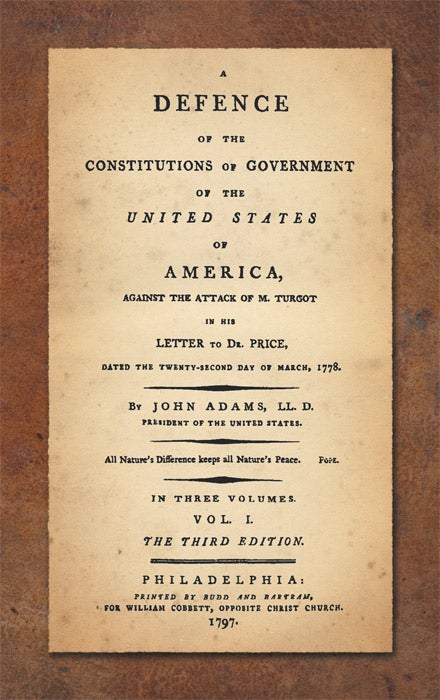 AM | @agumack
AM | @agumack"... such an assembly runs faster and easier into an oligarchy" — John Adams
John Adams escribió y actuó abundantemente en defensa de la independencia judicial. Lo muestran, entre otros, sus ensayos de 1773 "On the Independence of the Judges", su actuación en el caso de la 'masacre de Boston', su panfleto "Thoughts of Government", y su participación decisiva en la Constitución de Massachusetts de 1780. Uno de sus mayores logros como constitucionalista, como bien señala Richard Alan Ryerson, es haber evitado la elección 'popular' de jueces en la constitución de Massachusetts, que se mantiene vigente en 2020 (*). Hoy en día, la elección 'popular' de jueces en muchos Estados en EEUU explica las menores notas en independencia judicial de este país, comparado con los Nórdicos, Alemania, Holanda, Canadá, Nueva Zelanda [ver]. Es fácil comprenderlo: hay tanto en juego en la elección de jueces—propiedad, regulación, multas—, que los 'lobbies' siempre terminan por decidir el resultado—ilustrando de manera impactante la idea de Aristóteles: el principio electivo es oligárquico.
* * *
El tomo III de Defence of the Constitutions of the United States of America (1787) contiene un largo, apasionado y desordenado comentario sobre un libro publicado en 1656 por Marchamont Nedham, The Excellency of a Free State, or the Right Constitution of a Commonwealth. Opuesto a la idea de contrapesos institucionales —y crítico de Oceana de James Harrington— Nedham defiende la idea de un poder legislativo unicameral que concentra la suma del poder soberano. En unas páginas geniales, con un envión retórico poco común en él, Adams muestra cómo los líderes parlamentarios de la mayoría destruirán toda noción de independencia judicial, abriendo las puertas a la corrupción en gran escala (†). Adams está tan seguro de sí, que anticipa —en base a precedentes históricos— lo que tiene que suceder en una situación similar.
En su esquema, no puede haber ninguna duda: la ausencia de contrapesos al poder es, fue y será siempre la definición misma de la corrupción. La corrupción afectará a todos: políticos, empresarios, hombres de iglesia, médicos, actores y periodistas. Todo será hecho por los que detienen la mayoría en la asamblea para gratificar "su ambición y vanidad, avaricia y deseo, odio, resentimiento, maldad y venganza, y todas sus pasiones, sin la restricción de un poder que los controle." Naturalmente, el grupo que los lidera deviene en poco tiempo una oligarquía. La cita es larga, pero vale la pena (lo más tremendo viene al final):
The judges will be appointed by them and their party, and of consequence, will be obsequious enough to their inclinations. The whole judicial authority, as well as the executive, will be employed, perverted and prostituted to the purpose of electioneering. No justice will be attainable, nor will innocence or virtue be safe, in the judicial courts, but for friends of the prevailing leaders; legal persecutions will be instituted and carried out against opposers, to their vexation and ruin; and as they have the public purse at command, as well as the executive and judicial power, the public money will be expended in the same way.
No favors will be attainable but by those who will court the ruling demagogues in the house, by voting for their friends and instruments; and pensions and pecuniary rewards and gratifications, as well as honors and offices of every kind, will be voted to friends and partisans. The leading minds and most influential characters among the clergy will be courted, and the views of the youth in this department will be turned upon those men, and the road to promotion and employment in the church will be obstructed against such as will not worship the general idol. Capital characters among the physicians will not be forgotten, and the means of acquiring reputation and practice in the healing art will be to get the state trumpeters on the side of the youth.
The bar, too, will be made so subservient, that a young gentleman will have no chance to obtain a character of clients, but by falling in with the views of the judges and their creators. Even the theatres, and actors, must become politicians, and convert the public pleasures into engines of popularity for the governing members of the house. The press, that great barrier and bulwark of the rights of mankind, when it is protected in its freedom by law, can now no longer be free; if the authors, writers and printers, will not accept of the hire that will be offered them, they must submit to the ruin that will be denounced against them.
The presses, with much secrecy and concealment, will be made the vehicles of calumny against the minority, and of panegyric and empirical applauses to the leaders of the majority, and no remedy can possibly be obtained. In one word, the whole systems of affairs, and every conceivable motive of hope and fear, will be employed to promote the private interests of a few, and their obsequious majority; and there is no remedy but in arms. Accordingly we find in all the Italian republics the minority always were driven to arms in despair.
Note el final: las minorías oprimidas recurrirán a las armas. La mayoría irrestricta que des-gobierna y saquea a Venezuela lo comprobará algún día.
(*) Ver su notable John Adams' Republic. The One, the Few and the Many. Baltimore: Johns Hopkins University Press, 2016.
(†) The Works of John Adams, Vol. VI. Boston: Little & Brown, 1851 (es la edición del Charles Francis Adams, nieto de John).
________________
No comments:
Post a Comment